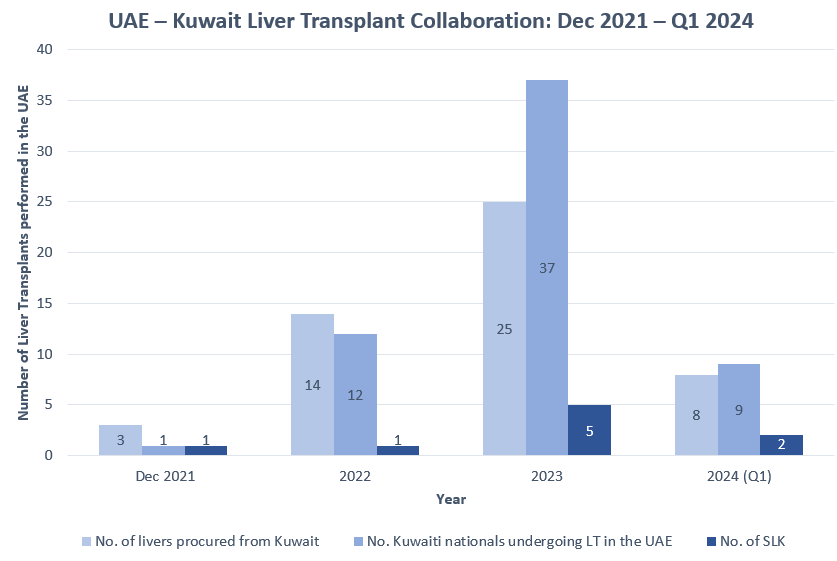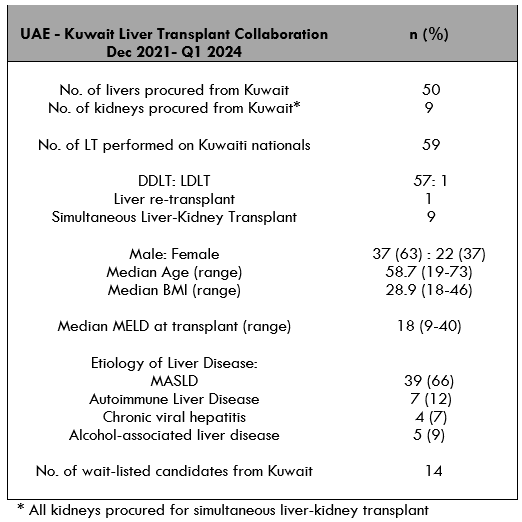Collaborative organ sharing in the Middle East: The United Arab Emirates - Kuwait liver transplant experience
Shiva Kumar1, Ali Al Obaidli2, Mustafa Al Mousawi4, Maria Gomez3, Cristiano Quintini1, Giuseppe Iuppa1, Essa Al Essa1, Teresa Diago-Uso1, Muhammad Baig1, Baraa Abduljawad1, Kailash Makhejani1, Sulieman Abdalraheem1, Maen Al Mattooq4, Muneera Al Tarrah4, Mohammad Jamal4, Salwa Hashhash1, Arun Kumar1, Fazil Ashiq1, Andrei Minou1, Goutham Vijayan1, Sandra El Hajj1, Numan Balci1, Katie Winter1, Liliana Camilo1, Luis Campos1.
1Transplant Center, Cleveland Clinic Abu Dhabi, Abu Dhabi, United Arab Emirates; 2National Committee for Organ Donation and Transplantation, Dept. of Health, Abu Dhabi, United Arab Emirates; 3The National Center for Regulating Donation and Transplantation of Human Organs and Tissues, UAE Ministry of Health and Prevention, Sharjah, United Arab Emirates; 4Kuwait Transplant, Ministry of Health, Kuwait City, Kuwait
Introduction: Transplantation in the United Arab Emirates (UAE) was established in accordance with the provisions indicated in the Federal Decree Law No. 5 of 2016 on Regulation of Human Organs and Tissue Transplantation, with subsequent confirmation of the legal definition of brain death in May 2017. Collaborative organ sharing programs in Europe have highlighted the impact of cross-border organ allocation in enabling optimal utilization of deceased donor organs. We summarize the outcomes from our organ sharing collaboration with Kuwait and highlight its impact in meeting the needs of our patients.
Methods: In the Middle East Gulf region, there is a scarcity of established programs in deceased organ donation. Apart from the UAE and the Kingdom of Saudi Arabia, few other countries in the region have established programs in deceased organ donation. This presented a unique opportunity to establish a collaborative organ sharing agreement that would optimize utilization of deceased donor organs in the region and provide improved access to liver transplant (LT). A successful organ sharing agreement was initiated with Kuwait in December 2021, that has since grown significantly and provided timely access to Kuwaiti nationals in need of LT, while promoting awareness of deceased organ donation.
Results: Recipients from the UAE and Kuwait are listed on a common waitlist with prioritization based on the MELD-based organ allocation policy. All LT as part of this collaborative initiative were performed at Cleveland Clinic Abu Dhabi, the nation’s only multi-organ transplant center. Since the inception of LT in Kuwait in 2018, the country had performed 11 deceased donor LT prior to the operationalization of this organ sharing agreement in Dec 2021. Since then, until Q1 2024, we have successfully procured 50 livers and 9 kidneys from deceased organ donors in Kuwait and transplanted 59 Kuwaiti nationals – including 9 simultaneous liver-kidney (SLK) transplants (Figure 1).

Metabolic dysfunction associated steatotic liver disease was the primary driver of the need for LT (Figure 2).

Among Kuwaiti nationals transplanted at CCAD, one year liver allograft survival is 94.8% (95% CI: 80.8 – 98.7), with 1-year patient survival of 97.4% (95% CI: 83 – 99.7). Our partnership with Kuwait transplant has ensured the seamless transition of post-transplant care to Kuwait. This model has since been successfully extended to include pancreas and thoracic organ transplantation as well.
Conclusions: To summarize, six years after initiating liver transplantation, while the UAE has emerged as a regional leader in deceased organ donation, enhanced regional collaboration as exemplified by our collaboration with Kuwait, has helped meet the needs of patients in the broader region, while also promoting awareness of deceased organ donation. Lessons learnt from this successful collaborative partnership could also potentially be expanded to other nations in the region that lack established infrastructure to support deceased organ donation.
[1] Organ sharing
[2] Deceased organ donation
